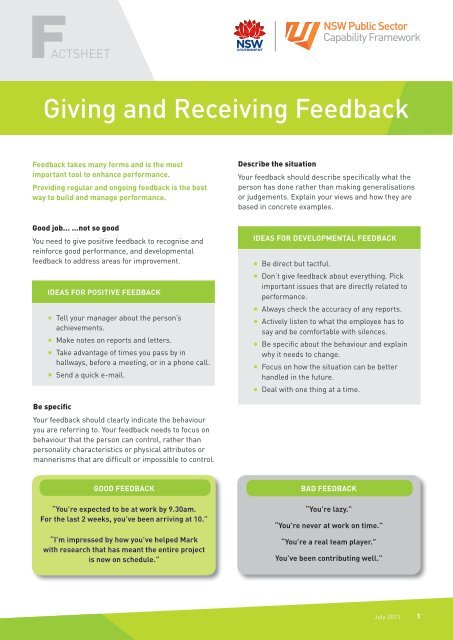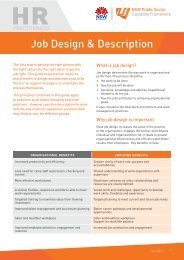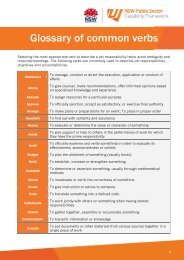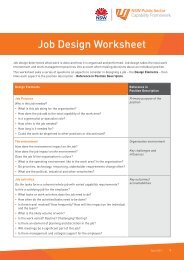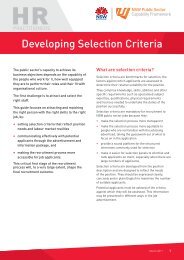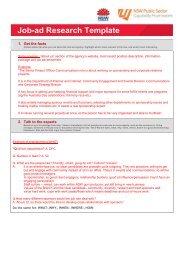Giving and Receiving Feedback
Giving and Receiving Feedback
Giving and Receiving Feedback
Create successful ePaper yourself
Turn your PDF publications into a flip-book with our unique Google optimized e-Paper software.
Good feedback needs to provide enough informationfor the employee to make a decision on whichbehaviours to reinforce <strong>and</strong> which behaviours needto change. Both positive <strong>and</strong> developmental feedbackcan be bad feedback: it is bad if it does not provideenough information to reinforce or discourage certainbehaviours.Having difficult conversationsEveryone will experience a time when they need tohave a difficult conversation with an employee, asupervisor or even peers.Tips for providing difficult feedbackAsk firstStart softDon’t involveothersKeep it simpleWhat’s theimpact?ReachagreementEven if you have a close working relationship with the person, ask if you can share somefeedback. If it’s not a good time, suggest another time or place to share the feedback.Give the person a chance to brace for potentially uncomfortable or embarrassing feedback.Most people are as uncomfortable providing feedback as the person receiving the feedback.Even if others have complained or provided information, do not amplify the feedback or passresponsibility on to others. This only heightens the embarrassment <strong>and</strong> makes the situationmore uncomfortable.Be straightforward, simple <strong>and</strong> make sure the person underst<strong>and</strong>s you are addressing theissue because it will help the situation at work.Tell the person how changing their behaviour will improve the situation <strong>and</strong> also let themknow what impact doing nothing would have.Agree on what the person will do to change their behaviour <strong>and</strong>, if appropriate, set atimeframe.<strong>Receiving</strong> <strong>Feedback</strong><strong>Feedback</strong> can be just as difficult to hear as it can be togive. Learning how to be comfortable when receivingfeedback from others on your performance is animportant skill.<strong>Feedback</strong> can be an effective prompt for personal<strong>and</strong> work improvement because it can identify skills<strong>and</strong> behaviours that you need to learn or developto be successful. <strong>Feedback</strong> can also be positive byreinforcing <strong>and</strong> encouraging what you are doing.<strong>Feedback</strong> can help you develop better workingrelationships with the rest of the team by giving you abetter underst<strong>and</strong>ing of how your actions impact onothers.If you are receiving feedback that does not appear tobe constructive, you should ask the person to providesome specific comments that would help you improveyour work or behaviour.You may like to ask for feedback if you are not sureabout your performance or haven’t heard from yourmanager for a while.receiving feedback• You should allow the person to talk <strong>and</strong>actively listen.• Ask the person for specific details <strong>and</strong> makesure you underst<strong>and</strong> what they are talkingabout• If the person is talking about a personalcharacteristic or a personal attribute, ask theperson about your specific behaviourJuly 2011 2
<strong>Feedback</strong> from different sourcesSome agencies will gather feedback from a varietyof sources to use to measure your performance.Gathering feedback from many sources increasesits reliability <strong>and</strong> provides a more accurate pictureof how you are performing. However, gatheringfeedback from some of these sources requires time,thought <strong>and</strong> planning <strong>and</strong> you need to strike a balancebetween the value to be gained by collecting thefeedback <strong>and</strong> the time required to collect it.<strong>Feedback</strong> from your managerIt is important to recognise that line managershave different management styles. Therefore, whenreceiving feedback you need to listen to the substancerather than the style of the feedback. Overall, you arereceiving feedback so that you can improve in yourrole <strong>and</strong> there is no need to feel threatened by it.<strong>Feedback</strong> to your managerManagers need to continually assess their ownperformance as a manager, including being aware ofhow employees respond to the feedback they give <strong>and</strong>listening to what employees say about how they <strong>and</strong>the team are being managed.Peers <strong>and</strong>colleaguesDirectreportsManagerSELFCustomersJuly 2011 3


